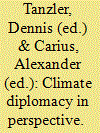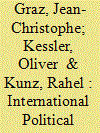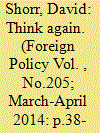|
|
|
Sort Order |
|
|
|
Items / Page
|
|
|
|
|
|
|
| Srl | Item |
| 1 |
ID:
179616


|
|
|
|
|
| Summary/Abstract |
Leaders’ Summit on Climate (virtual platform, April 22 and 23, 2021) organised by the United States of America under the leadership of U.S. president Joe Biden put back the spot-on climate change and climate crisis as a global commons problem. Interestingly, it coincided with the fifth anniversary of the opening of signature of the Paris Agreement on climate change (during 22 April 2016 to 21 April 2017) which had called for limiting/ restricting limit global warming to well below 2, preferably to 1.5 degrees Celsius, compared to pre-industrial levels.
|
|
|
|
|
|
|
|
|
|
|
|
|
|
|
|
| 2 |
ID:
193563


|
|
|
|
|
| Publication |
Berlin, Berliner Wissenschafts-Verlag, 2012.
|
| Description |
143p.pbk
|
| Standard Number |
9783830530558
|
|
|
|
|
|
|
|
|
|
|
|
Copies: C:1/I:0,R:0,Q:0
Circulation
| Accession# | Call# | Current Location | Status | Policy | Location |
| 060488 | 363.5492056/TAAN 060488 | Main | On Shelf | General | |
|
|
|
|
| 3 |
ID:
112345


|
|
|
|
|
| Publication |
2012.
|
| Summary/Abstract |
For too long, climate diplomacy has focused on carbon dioxide. But at least 40 percent of global warming can be blamed on shorter-lived pollutants, which also cause disease and damage crops in developing states. Reining in pollution would thus accomplish two goals, while finally getting countries such as China and India into the climate-change business.
|
|
|
|
|
|
|
|
|
|
|
|
|
|
|
|
| 4 |
ID:
169782


|
|
|
|
|
| Summary/Abstract |
This forum opens a debate that is long overdue: for far too long, the fields of international political sociology (IPS) and international political economy (IPE) have been standing apart. Discussions take place in different conference sections, in different networks that publish in different journals. Yet, this divide is surprising given that the two fields share similar trajectories, theoretical concerns, problématiques, and conceptual challenges. This forum starts exploring this shared terrain: we believe that there is no a priori reason to separate the sociocultural, the political and the economic when we aim at making sense of the world in any meaningful way. We propose that bridging the IPE-IPS divide has tremendous potential for the development of a socio-political economy analysis that, we believe, has two benefits. First, it allows for the opening of new empirical terrains or deepening and widening existing ones. Second, bringing IPE/S back together creates reflexive spaces for more holistic, embodied and contextualised conceptual innovation. The contributors to this forum show each in their own way such empirical and conceptual added value of moving beyond the IPE and IPS divide in order to develop what we call here a socio-political economy of the globe. They focus on various issues, such as the transformation of capitalism from an oil- to a data-dependent accumulation regime with the rising of the so-called ‘digital age’ (Chenou); the profound social, economic and political transformation triggered by urbanisation in the development world (Elias, Rethel and Tilley); emerging global risks and the neglected role of the insurance industry (Lobo-Guerrero); regional development-security nexuses (Lopez Lucia); and business power in climate change diplomacy (Moussu).
|
|
|
|
|
|
|
|
|
|
|
|
|
|
|
|
| 5 |
ID:
129231


|
|
|
|
|
| Publication |
2014.
|
| Summary/Abstract |
An Ironclad Treaty Is the Only Way to Save the Planet. Don't count on it. Time is running short for the international community to tackle climate change. Pressure to act comes from rising temperatures and sea levels, superstorms, brutal droughts, and diminishing food crops. It also comes from fears that these problems are going to get worse. Modern economies have already boosted the concentration of carbon dioxide (CO2) in the atmosphere by 40 percent since the Industrial Revolution. If the world stays on its current course, CO2 levels could double by century's end, potentially raising global temperatures several more degrees. (The last time the planet's CO2 levels were so high was 15 million years ago, when temperatures were 5 to 10 degrees Fahrenheit higher than they are today.) Another source of pressure, however, is self-imposed. Under the auspices of the United Nations, the next global climate treaty -- to be negotiated among some 200 countries, with the central goal of cutting greenhouse gas emissions -- should be enacted in 2015, to replace the now-outmoded 1997 Kyoto Protocol. (Once passed by state parties, the new treaty would actually go into effect in 2020.)
|
|
|
|
|
|
|
|
|
|
|
|
|
|
|
|
|
|
|
|
|